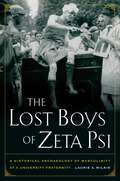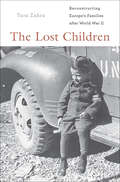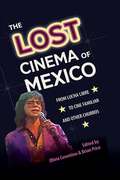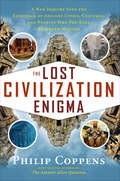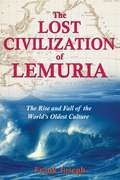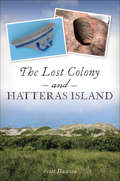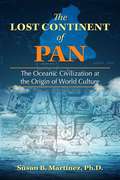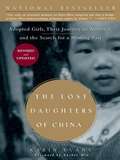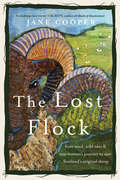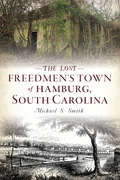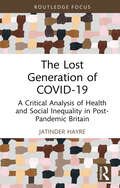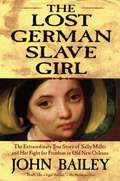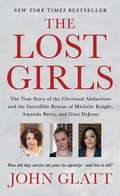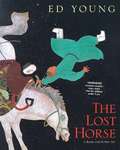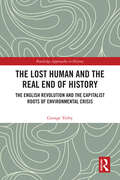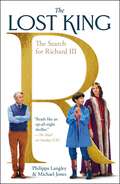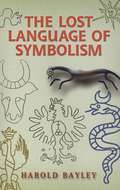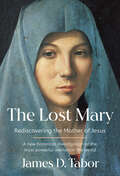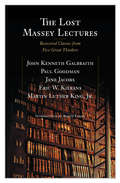- Table View
- List View
The Lost Boys of Zeta Psi: A Historical Archaeology of Masculinity at a University Fraternity
by Laurie A. WilkieThe Lost Boys of Zeta Psi takes us inside the secret, amusing, and sometimes mundane world of a California fraternity around 1900. Gleaning history from recent archaeological excavations and from such intriguing sources as oral histories, architecture, and photographs, Laurie A. Wilkie uncovers details of everyday life in the first fraternity at the University of California, Berkeley, and sets this story into the rich social and historical context of West Coast America at the turn of the last century. In particular, Wilkie examines men’s coming-of-age experiences in a period when gender roles and relations were undergoing dramatic changes. Her innovative study illuminates shifting notions of masculinity and at the same time reveals new insights about the inner workings of fraternal orders and their role in American society.
The Lost British Serial Killer: Closing the case on Peter Tobin and Bible John
by David Wilson Paul HarrisonThe definitive and explosive account of a harrowing murder case that has shocked BritainPeter Tobin was already serving a life sentence for murder when he was charged with the murder of two young women - Vicky Hamilton and Dina McNichol, in November 2007. Both girls went missing in 1991. Their bodies were discovered by police in 50 Irvine Drive, Margate - where Tobin once lived. In their new true crime investigation, Paul Harrison and Professor David Wilson examine this shocking case, including full details of Tobin's trial. But perhaps even more importantly, they look into other similar cases around the country. With developments in DNA testing, the police are coming closer and closer to solving a range of terrible and high profile murders. There have been at least five major arrests in recent months, with further arrests sure to follow.Harrison and Wilson investigate these cases, and ask how new DNA tests will change police investigations. But they also ask whether this will be enough to stop murderers in the future, and whether there are larger forces at work in society that need to be addressed before we can stop people from killing again and again.
The Lost British Serial Killer: Closing the case on Peter Tobin and Bible John
by David Wilson Paul HarrisonThe definitive and explosive account of a harrowing murder case that has shocked BritainPeter Tobin was already serving a life sentence for murder when he was charged with the murder of two young women - Vicky Hamilton and Dina McNichol, in November 2007. Both girls went missing in 1991. Their bodies were discovered by police in 50 Irvine Drive, Margate - where Tobin once lived. In their new true crime investigation, Paul Harrison and Professor David Wilson examine this shocking case, including full details of Tobin's trial. But perhaps even more importantly, they look into other similar cases around the country. With developments in DNA testing, the police are coming closer and closer to solving a range of terrible and high profile murders. There have been at least five major arrests in recent months, with further arrests sure to follow.Harrison and Wilson investigate these cases, and ask how new DNA tests will change police investigations. But they also ask whether this will be enough to stop murderers in the future, and whether there are larger forces at work in society that need to be addressed before we can stop people from killing again and again.
The Lost Children: Reconstructing Europe's Families after World War II
by Tara Zahra&“This impressive . . . study charts the history of [post WWII] humanitarian relief . . . demonstrating how the institutions of the family became politicized.&” (Library Journal) During the Second World War, an unprecedented number of families were torn apart. As the Nazi empire crumbled, millions roamed the continent in search of their loved ones. The Lost Children tells the story of these families. We see how the reconstruction of families quickly became synonymous with the survival of European civilization itself. Based on original research in German, French, Czech, Polish, and American archives, The Lost Children is a heartbreaking and mesmerizing story. It brings together the histories of eastern and western Europe, and traces the efforts of everyone―from Jewish Holocaust survivors to German refugees, from Communist officials to American social workers―to rebuild the lives of displaced children. It reveals that many seemingly timeless ideals of the family were actually conceived in the concentration camps, orphanages, and refugee camps of the Second World War, and shows how the process of reconstruction shaped Cold War ideologies and ideas about childhood and national identity. This riveting tale of families destroyed by war reverberates in the lost children of today&’s wars and in the compelling issues of international adoption, human rights and humanitarianism, and refugee policies. &“Fascinating.&” ―New Republic &“[A] superb book . . . [A] wide-ranging, exceptionally well-researched study.&” ―Tablet Magazine &“Zahra&’s work is insightful in considering what treatment of lost children can tell us about broader developments in the post-war period, both in terms of how nations interacted with each other and how psychologists understood the impact of war on children.&” —Times Higher Education
The Lost Cinema of Mexico: From Lucha Libre to Cine Familiar and Other Churros (Reframing Media, Technology, and Culture in Latin/o America)
by Olivia Cosentino and Brian PriceThe Lost Cinema of Mexico is the first volume to challenge the dismissal of Mexican filmmaking during the 1960s through 1980s, an era long considered a low-budget departure from the artistic quality and international acclaim of the nation’s earlier Golden Age. This pivotal collection examines the critical implications of discovering, uncovering, and recovering forgotten or ignored films.This largely unexamined era of film reveals shifts in Mexican culture, economics, and societal norms as state-sponsored revolutionary nationalism faltered. During this time, movies were widely embraced by the public as a way to make sense of the rapidly changing realities and values connected to Mexico’s modernization. These essays shine a light on many genres that thrived in these decades: rock churros, campy luchador movies, countercultural superocheros, Black melodramas, family films, and Chili Westerns.Redefining a time usually seen as a cinematic “crisis,” this volume offers a new model of the film auteur shaped by productive tension between highbrow aesthetics, industry shortages, and national audiences. It also traces connections from these Mexican films to Latinx, Latin American, and Hollywood cinema at large.A volume in the series Reframing Media, Technology, and Culture in Latin/o America, edited by Héctor Fernández L’Hoeste and Juan Carlos RodríguezPublication of this work made possible by a Sustaining the Humanities through the American Rescue Plan grant from the National Endowment for the Humanities.
The Lost Civilization Enigma: A New Inquiry Into the Existence of Ancient Cities, Cultures, and Peoples Who Pre-Date Recorded History
by Philip CoppensAn examination of archaeological controversies, with arguments showing evidence of prehistoric civilizations not recorded as part of human history.Are history books giving us the whole story? Or is civilization far more complex and older than we have been taught?Our school textbooks barely mention the 6,000-year-old Sumerian civilization, yet the latest archaeological findings at sites such as Jericho and, most recently, Gobekli Tepe in Turkey have been dated to 10,000 BC.Civilization goes back at least another 10,000 years, if we are willing to believe what our ancestors themselves claimed.The Lost Civilization Enigma reveals the truth about:Lost magnitudes to known cultures, such as the Bosnian Pyramids and the civilization of “Old Europe.”The fabled lost “golden” cities of South America and the Amazon, which are slowly being rediscovered.Fascinating examples of lost technology, such as the Antikythera Device.Atlantis and the fact that it was a real civilization.Analyzing the historical and archaeological record, best-selling author Philip Coppens demonstrates that there is substantial evidence that civilization is far older, far more advanced, and far more special than is currently accepted. Clearly, our history books have left out a great deal!
The Lost Civilization of Lemuria: The Rise and Fall of the World’s Oldest Culture
by Frank JosephA compelling new portrait of the lost realm of Lemuria, the original motherland of humanity• Contains the most extensive and up-to-date archaeological research on Lemuria• Reveals a lost, ancient technology in some respects more advanced than modern science• Provides evidence that the perennial philosophies have their origin in Lemurian cultureBefore the Indonesian tsunami or Hurricane Katrina’s destruction of New Orleans, there was the destruction of Lemuria. Oral tradition in Polynesia recounts the story of a splendid kingdom that was carried to the bottom of the sea by a mighty “warrior wave”--a tsunami. This lost realm has been cited in numerous other indigenous traditions, spanning the globe from Australia to Asia to the coasts of both South and North America. It was known as Lemuria or Mu, a vast realm of islands and archipelagoes that once sprawled across the Pacific Ocean. Relying on 10 years of research and extensive travel, Frank Joseph offers a compelling picture of this motherland of humanity, which he suggests was the original Garden of Eden.Using recent deep-sea archaeological finds, enigmatic glyphs and symbols, and ancient records shared by cultures divided by great distances that document the story of this sunken world, Joseph painstakingly re-creates a picture of this civilization in which people lived in rare harmony and possessed a sophisticated technology that allowed them to harness the weather, defy gravity, and conduct genetic investigations far beyond what is possible today. When disaster struck Lemuria, the survivors made their way to other parts of the world, incorporating their scientific and mystical skills into the existing cultures of Asia, Polynesia, and the Americas. Totem poles of the Pacific Northwest, architecture in China, the colossal stone statues on Easter Island, and even the perennial philosophies all reveal their kinship to this now-vanished civilization.
The Lost Colony and Hatteras Island
by Scott DawsonNew archeological discoveries may finally solve the greatest mystery of Colonial America in this history of Roanoke and Hatteras Islands. Established on what is now North Carolina&’s Roanoke Island, the Roanoke Colony was intended to be England&’s first permanent settlement in North America. But in 1590, the entire population disappeared without a trace. The only clue to their fate was the word &“Croatoan&” carved into a tree. For centuries, the legend of the Lost Colony has captivated imaginations. Now, archaeologists from the University of Bristol, working with the Croatoan Archaeological Society, have uncovered tantalizing clues to the fate of the colony. In The Lost Colony and Hatteras Island, Hatteras native and amateur archaeologist Scott Dawson compiles what scholars know about the Lost Colony along with what scholars have found beneath the soil of Hatteras.
The Lost Colony of the Templars: Verrazano's Secret Mission to America
by Steven SoraReveals the existence of a Templar colony in the New World and how the explorer Verrazano, also a member of a secret society, attempted to reestablish contact with it • Explores Columbus’s connection to Henry Sinclair’s maps of the New World • Examines the secret alliance of Catholic Sulpicians and French Huguenots to preserve the Templar legacy • Reveals the hidden knowledge preserved in the Templar baptisteries found throughout Europe and in Newport, Rhode Island In 1524 the Italian explorer Giovanni da Verrazano was sent by the French king Francis I on an expedition ostensibly to find a shorter route to China. However, his true mission, Steven Sora suggests, was to contact a Templar colony that might have been established in Newport, Rhode Island, by Henry Sinclair at the end of the 14th century. In his expedition log Verrazano recorded that his only stay on this journey was at Newport Harbor, the site of a tower built to the exact measurements of a Templar baptistery, a sacred sanctuary representing baptism and eternal life. This tower is a remnant of Sinclair’s voyage to America nearly a century before that of Columbus (who had access to Sinclair’s maps thanks to his wife, who was Sinclair’s great-granddaughter). While Verrazano’s mission succeeded in finding the tower, the colony itself eluded him. His backers then decided to resurrect the dream of Acadia--a place where they could aspire to higher knowledge without fear of Church or state--by creating a new Secret Society that included Huguenots and Catholic Sulpicians. This Company of the Holy Sacrament would lay the foundations for Montreal in an attempt to realize the ambitions of Sinclair and his Templar companions, as well as to stave off efforts by the Jesuits to transform Quebec into a fiefdom of the orthodox Church. Quebec’s motto, “Je me souviens” (I remember), is a reference to this secret history.
The Lost Continent of Pan: The Oceanic Civilization at the Origin of World Culture
by Susan B. MartinezReveals the Pacific Ur-culture that seeded the ancient civilizations of China, Egypt, India, Mexico, and Peru• Shows how the Pan diaspora explains the similarities between Gobekli Tepe and Toltec carvings and stone towers in Japan and on Easter Island• Reveals the mother tongue of Pan hidden in shared word roots in vastly different languages, including Quechua, Sanskrit, Japanese, Greek, and Sumerian• Explains the red-haired Caucasian mummies of China, the Ainu of Japan, the presence of “white” humans in early Native American legend, and other light-skinned peoples found in Southeast Asia and the Middle EastThe destruction of the vast continent of Pan--also known as Lemuria or Mu--in the Pacific Ocean 24,000 years ago was the greatest catastrophe that ever befell humanity. Yet it resulted in a prehistoric Golden Age of arts and technology thanks to the Sons of Noah, who, forewarned and prepared for the disaster, escaped in 5 organized fleets. Theirs was the masterful Ur-culture that seeded China, Egypt, India, Mexico, and Peru, explaining the sudden injection of the same advanced knowledge and sophisticated arts into those widely separated lands. Examining the diaspora from the sunken continent of Pan, Susan B. Martinez finds traces of the oceanic Pan civilization in arts and technologies from canal-works, masonry, and agriculture to writing, weaving, and pottery, but most importantly in the art of navigation, the hallmark of the survivors of the catastrophe. Using archaeo-linguistic analysis, she reveals the mother tongue of Pan hidden in strikingly similar words for royalty, deities, and important places in vastly different languages, including Quechua, Maori, Sanskrit, Japanese, Chinese, Greek, and Sumerian, as well as English through the prefix “pan” which denotes “all-encompassing.” The author reveals how the Pan diaspora explains the mound builders on each continent, the presence of “white” humans in Native American legend, the red-haired mummies found in China, and the Ainu of Japan. She shares recent genetic studies that reveal Polynesian DNA in central Europeans, Mesopotamians, South Americans, and the 9000-year-old Kennewick man and shows how Pan provides the missing link. She reveals why carvings at Gobekli Tepe are similar to Toltec artistry, why stone towers in Japan and Easter Island are identical, and how the Pacific Ring of Fire was activated. Moving the Garden of Eden from the Fertile Crescent to the South Seas, Martinez strikes down the pervasive view of Atlantis as the source of ancient knowledge and exposes the original unity of mankind on the ancient Pacific continent of Pan.
The Lost Daughters of China
by Karin EvansIn 1997 journalist Karin Evans walked into an orphanage in southern China and met her new daughter, a beautiful one-year-old baby girl. In this fateful moment Evans became part of a profound, increasingly common human drama that links abandoned Chinese girls with foreigners who have traveled many miles to complete their families. At once a compelling personal narrative and an evocative portrait of contemporary China, The Lost Daughters of China has also served as an invaluable guide for thousands of readers as they navigated the process of adopting from China. However, much has changed in terms of the Chinese government?s policies on adoption since this book was originally published and in this revised and updated edition Evans addresses these developments. Also new to this edition is a riveting chapter in which she describes her return to China in 2000 to adopt her second daughter who was nearly three at the time. Many of the first girls to be adopted from China are now in the teens (China only opened its doors to adoption in the 1990s), and this edition includes accounts of their experiences growing up in the US and, in some cases, of returning to China in search of their roots. Illuminating the real-life stories behind the statistics, The Lost Daughters of China is an unforgettable account of the red thread that winds form China?s orphanages to loving families around the globe. .
The Lost Flock: Rare Wool, Wild Isles and One Woman’s Journey to Save Scotland’s Original Sheep
by Jane CooperThe Lost Flock is the story of the remarkable and rare little horned sheep, known as Orkney Boreray, and the wool-obsessed woman who moved to one of Scotland’s wildest islands to save them. It was Jane Cooper’s passion for knitting that led her to discover the world of rare-breed sheep and their wool. Through this, Jane uncovered the ‘Orkney Borerary’ – a unique group within the UK’s rarest breed of sheep, the Boreray, and one of the few surviving examples of primitive sheep in northern Europe. As her knowledge of this rarest of heritage breeds grew, she took the bold step to uproot her quiet suburban life in Newcastle and relocate to Orkney, embarking on a new adventure and life as farmer and shepherd. Jane was astonished to find that she was the sole custodian of this lost flock in the world, and so she began investigating their mysterious and ancient history, tracking down the origins of the Boreray breed and its significance to Scotland’s natural heritage. From Viking times to Highland crofts and nefarious research experiments in Edinburgh, this is a so-far untold real-life detective story. It is also the story of one woman’s relentless determination to ensure a future for her beloved sheep, and in doing so revealing their deep connection to the Scottish landscape. An unforgettable story of a heritage breed and the importance of its existence.
The Lost Freedmen's Town of Hamburg, South Carolina (Lost)
by Michael S. SmithHamburg is perhaps South Carolina's most famous ghost town. Founded in 1821, it grew to four thousand residents before transportation advances led to decline. During Reconstruction, recently freed slaves reshaped Hamburg into a freedmen's village, where residents held local, county and state offices. These gains were wiped away after the Hamburg Massacre in 1876, a watershed event that left seven African Americans dead, most of them executed in cold blood. Yet more than a century after Hamburg, the one white supremacist killed in the melee is canonized by the racially divisive Meriwether Monument in downtown North Augusta. Author Michael Smith details the amazing events that created this unique community with a lasting legacy.
The Lost Generation of COVID-19: A Critical Analysis of Health and Social Inequality in Post-Pandemic Britain
by Jatinder HayreThe COVID-19 pandemic has wrought unparalleled disruption, altering the landscape of health and well-being for a generation. The Lost Generation of COVID-19 unveils the ways in which the crisis has deepened existing health disparities, casting a long shadow over young people’s futures.Set against the backdrop of austerity-induced cuts to UK public services, this book explores the social determinants of health, revealing how systemic neglect has been exacerbated by the pandemic’s relentless pressure. The analysis extends beyond individual hardships, illuminating the broader societal ramifications such as economic stagnation and social fragmentation. Yet, amidst the bleak landscape, the book offers a visionary perspective on the potential for transformative change. It posits that the pandemic serves as a catalyst for radical societal reform, advocating for a new economic paradigm anchored in equity and fairness. By addressing the root causes of health inequalities through innovative policy interventions and structural reforms, the author envisions a resilient and just society emerging from the shadows of the pandemic.Insightful and far-reaching, this book is an indispensable resource for students and scholars in the health sciences and political science, as well as for policymakers dedicated to these important issues.
The Lost German East
by Andrew DemshukA fifth of West Germany's post-1945 population consisted of ethnic German refugees expelled from Eastern Europe, a quarter of whom came from Silesia. As the richest territory lost inside Germany's interwar borders, Silesia was a leading objective for territorial revisionists, many of whom were themselves expellees. The Lost German East examines how and why millions of Silesian expellees came to terms with the loss of their homeland. Applying theories of memory and nostalgia, as well as recent studies on ethnic cleansing, Andrew Demshuk shows how, over time, most expellees came to recognize that the idealized world they mourned no longer existed. Revising the traditional view that most of those expelled sought a restoration of prewar borders so they could return to the east, Demshuk offers a new answer to the question of why, after decades of violent upheaval, peace and stability took root in West Germany during the tense early years of the Cold War.
The Lost German Slave Girl: The Extraordinary True Story Of The Slave Sally Miller And Her Fight For Freedom In Old New Orleans
by John BaileyIt is a spring morning in New Orleans, 1843. In the Spanish Quarter, on a street lined with flophouses and gambling dens, Madame Carl recognizes a face from her past. It is the face of a German girl, Sally Miller, who disappeared twenty-five years earlier. But the young woman is property, the slave of a nearby cabaret owner. She has no memory of a "white" past. Yet her resemblance to her mother is striking, and she bears two telltale birthmarks. In brilliant novelistic detail, award-winning historian John Bailey reconstructs the exotic sights, sounds, and smells of mid-nineteenth-century New Orleans, as well as the incredible twists and turns of Sally Miller's celebrated and sensational case. Did Miller, as her relatives sought to prove, arrive from Germany under perilous circumstances as an indentured servant or was she, as her master claimed, part African, and a slave for life? A tour de force of investigative history that reads like a suspense novel, The Lost German Slave Girl is a fascinating exploration of slavery and its laws, a brilliant reconstruction of mid-nineteenth-century New Orleans, and a riveting courtroom drama. It is also an unforgettable portrait of a young woman in pursuit of freedom.
The Lost Girls: The True Story Of The Cleveland Abductions And The Incredible Rescue Of Michelle Knight, Amanda Berry, And Gina Dejesus
by John GlattThey were held in brutal captivity—and managed to make it out alive. This is their story.
The Lost Horse: A Chinese Folktale
by Ed Young Tracey AdamsThe Caldecott Medalist's magnificent illustrations combine paint and paper collage to animate this ancient Chinese story of a wild horse that brings extraordinary reversals of fortune to its trusting owner. Three removable, cut-paper puppets invite young readers to act out the story and to create exciting new tales of their own.
The Lost Human and the Real End of History: The English Revolution and the Capitalist Roots of Environmental Crisis (Routledge Approaches to History)
by George YerbyThis book analyses the transformation in 16th- and 17th- century English economic life that overturned the traditional restraints of the medieval economy for the commercial ethos that governs the modern world, and the resulting imbalance which opened the way to the environmental breakdown of today.On the open fields and commons, the smallholders had worked closely with the land as given, with minimal intervention in natural processes. The 16th century introduced a fundamental difference of approach as the inducement of exceptional profits encouraged manipulative exploitation of the land. “Freedom of trade” from arbitrary restraints and impositions became the new economic ethos, officially established by the mid-17th-century revolution and reinforced by other changes such as the emergence of the nationstate. The “rise of science” was associated with the agriculturalist adoption of empirical method for “improvement”, and a new philosophy accorded humankind the right to degrade other species for its own ends. By focusing on the causes and effects of capitalism at its first appearance, this volume traces the environmental crisis back to the switch from an essentially universalist to a basically individualist world.This book will be of interest to scholars and students of Early Modern England, Economic Studies, and Environmental Studies.
The Lost Key: The Supranatural Secrets of the Freemasons
by Robert LomasRobert Lomas is the bestselling co-author of The Hiram Key and other international bestsellers on Freemasonic mysteries. Many say he is the model for Dan Brown's hero, Robert Langdon.The Lost Key contains revelations that only an initiate of the highest orders of esoteric Freemasonry is in a position to make. Here is the truth behind the hints in Dan Brown's The Lost Symbol that Freemasonry is concerned to reawaken the hidden potentialities and powers of the human mind.The thrilling narrative of this new book follows a candidate for initiation as he rises through the different grades of initiation, taking part in ceremonies that are sometimes terrifying but always revealing of new knowledge and presenting new mysteries which will only be solved when the next stage of initiation has been achieved. Dramatic episodes include the re-enacting of an ancient murder from 3,000 years ago in full gory detail, lowering the candidate on the end of a rope into a dark vault under the floor of the temple, holding a dagger to the candidates naked breast, and making the candidate attend his own funeral.In the secret teachings revealed to some high-level initiates, there is a type of instruction which seems curiously similar to religious and mystical teachings. Astrology, angels, chakras and the powers of the mind to operate independently of the body, such as in remote viewing, are all a part of Freemasonic lore.Robert Lomas is both a physicist - he teaches physics at Bradford Unversity - and a Freemason. Here he reveals to a wider public and also explains these secret teachings for the first time. He shows that while they are dismissed as superstitious by campaigners for atheism such as Richard Dawkins, they are very much part of the strange, paradoxical world opened up by the latest thinking in quantum physics. This is why he prefers to call them 'Supranatural'.
The Lost Key: The Supranatural Secrets of the Freemasons
by Robert LomasRobert Lomas is the bestselling co-author of The Hiram Key and other international bestsellers on Freemasonic mysteries. Many say he is the model for Dan Brown's hero, Robert Langdon.The Lost Key contains revelations that only an initiate of the highest orders of esoteric Freemasonry is in a position to make. Here is the truth behind the hints in Dan Brown's The Lost Symbol that Freemasonry is concerned to reawaken the hidden potentialities and powers of the human mind.The thrilling narrative of this new book follows a candidate for initiation as he rises through the different grades of initiation, taking part in ceremonies that are sometimes terrifying but always revealing of new knowledge and presenting new mysteries which will only be solved when the next stage of initiation has been achieved. Dramatic episodes include the re-enacting of an ancient murder from 3,000 years ago in full gory detail, lowering the candidate on the end of a rope into a dark vault under the floor of the temple, holding a dagger to the candidates naked breast, and making the candidate attend his own funeral.In the secret teachings revealed to some high-level initiates, there is a type of instruction which seems curiously similar to religious and mystical teachings. Astrology, angels, chakras and the powers of the mind to operate independently of the body, such as in remote viewing, are all a part of Freemasonic lore.Robert Lomas is both a physicist - he teaches physics at Bradford Unversity - and a Freemason. Here he reveals to a wider public and also explains these secret teachings for the first time. He shows that while they are dismissed as superstitious by campaigners for atheism such as Richard Dawkins, they are very much part of the strange, paradoxical world opened up by the latest thinking in quantum physics. This is why he prefers to call them 'Supranatural'.
The Lost King: The Search for Richard III
by Michael Jones Philippa LangleyThe official inside story of the discovery of the bones of Richard III now a major motion picture starring Sally Hawkins and Steve Coogan The mystery of who Richard III really was has fascinated historians, readers and audiences familiar with Shakespeare's dastardly portrait of a hunchbacked monster of royalty for centuries. In 2012, the remains of a man with a curving spine, who possibly was killed in battle, were discovered underneath the paving of a parking lot in Leicester, England. Phillipa Langley, head of The Richard III Society, spurred on by the work of the historian Michael Jones, led the team of who uncovered the remains, certain that she had found the bones of the monarch. When DNA verification later confirmed that the skeleton was, indeed, that of King Richard III, the discovery ranks among the great stories of passionate intuition and perseverance against the odds.The news of the discovery of Richard's remains has been widely reported by the British as well as worldwide and was front page news for both the New York Times and The Washington Post. Many believe that now, with King Richard III's skeleton in hand, historians will finally begin to understand what happened to him following the Battle of Bosworth Field (twenty miles or so from Leicester) and, ultimately, to know whether he was the hateful, unscrupulous monarch of Shakespeare's drama or a much more benevolent king interested in the common man. Written in alternating chapters, with Richard's 15th century life told by historian Michael Jones (author of the critically acclaimed Bosworth - 1485) contrasting with the 21st century eyewitness account of the search and discovery of the body by Philippa Langley, The Lost King will be both an extraordinary portrait of the last Plantagenet monarch and the inspiring story of the archaeological dig that finally brings the real King Richard III into the light of day.
The Lost Language of Symbolism
by Harold BayleyThere's always a story behind the story, but the keenest observers have to break through the surface to reach it. This remarkable book reveals the hidden meaning behind familiar images and words, from the origins of Santa Claus and the meaning of Cinderella's name to the metaphoric significance of the unicorn and the fleur-de-lys.A prominent authority on symbols, author Harold Bayley spent years gathering and compiling the contents of this volume. Mythology, folklore, religious texts, and fairy tales from around the world constitute his primary sources. Bayley also draws upon the secret traditions of ancient cultures and medieval mystical sects to deconstruct the symbols embedded in watermarks and printers' emblems. Most of these images have lost their earliest significance and now serve strictly commercial purposes; Bayley explains their original meanings, and he cross-references similarities between symbols and stories across the globe to illuminate their evolving cultural significance. More than 1,400 illustrations enhance this classic work, which features an index for ease of reference.
The Lost Mary: Rediscovering the Mother of Jesus
by James D. TaborA world-renowned historian of early Christianity and ancient Judaism lifts the veil on the life of Mary—revealing her revolutionary role as the matriarch of the Jesus movement&“A great leap forward in understanding and contextualizing Mary&’s life, after two millennia of her being dismissed and rewritten by patriarchal power structures.&” —James Cameron, creator of Avatar, Titanic, and The Terminator&“The Lost Mary unfolds in five radical claims. . . . Together these arguments are Tabor&’s attempt to rescue Mary from pious abstraction and revolutionize our picture of her as one of the most consequential women in history. . . . In recovering her story, we discover not only the hidden roots of Christianity but also a model of resilience that speaks across time. Mary, Tabor shows, reminds us that behind every movement are women whose voices have been silenced, whose influence has been hidden in plain sight.&” —Candida Moss, National Geographic&“Tabor restores her voice, her faith, her motherhood, and, most of all, her humanity, in this groundbreaking portrait that challenges everything we thought we knew about the origins of Christianity.&” —Reza Aslan, author of ZealotMary, mother of Jesus, is the best known—and least known—woman in history. Revered and worshipped by millions, she remains a figment of the imagination, the ethereal subject of Raphaels and Botticellis, bathed in heavenly light, too virginal and pure to move among us.But what about the real Mary? The young Jewish woman and single mother of eight—five boys and three girls. The defiant citizen of Roman-occupied Galilee who survived through one of the most dangerous periods of Jewish history—an ancient &“game of thrones&” that claimed the lives of three of her sons: Jesus and Simon by crucifixion, James by stoning. The historical Mary whose teachings and courageous example may in fact make her the &“first founder&” of what we now call Christianity.This Mary has not only been lost to us—she has been systematically erased over the past two millennia by a theological, cultural, and political program intent on removing her from the human realm and marginalizing her womanhood, motherhood, and Jewishness.In The Lost Mary, James D. Tabor corrects the record, laying out the results of his intensive textual and archaeological sleuthing over the past three decades, including new evidence regarding Mary&’s genealogy (which may be hiding in plain sight in the New Testament!). Tabor&’s quest for the historical Mary offers a transformative perspective on Jesus and his early followers, and recovers the nature and essence of earliest Christianity.
The Lost Massey Lectures: Recovered Classics from Five Great Thinkers (The CBC Massey Lectures)
by Jane Jacobs Paul Goodman John Galbraith Eric Kierans Martin King Jr.The CBC Massey Lectures, Canada's preeminent public lecture series, are for many of us a highly anticipated annual feast of ideas. However, some of the finest lectures, by some of the greatest minds of modern times, have been lost for many years -- unavailable to the public in any form. Important thinkers whose Massey Lectures are lamentably out of print include the likes of Martin Luther King, Jr., John Kenneth Galbraith, Jane Jacobs, Paul Goodman, and Eric Kierans. Each of these lecturers spoke on a subject at the heart of their intellectual and spiritual concerns -- King on race and prejudice, Galbraith on economics and poverty, Jacobs on Canadian cities and Quebec separatism, Goodman on the moral ambiguity of America, Kierans on globalism and the nation-state -- and their words are not only of considerable historical significance but remain hugely relevant to the problems we face today. At last, a selection of these lost lectures is available to a world so hungry for, and yet in such short supply of, innovative ideas. The Lost Massey Lectures includes an introduction by Bernie Lucht, who has been the executive producer of CBC Radio's Ideas and the Massey Lectures since 1984.
